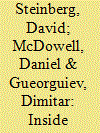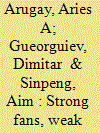|
|
|
Sort Order |
|
|
|
Items / Page
|
|
|
|
|
|
|
| Srl | Item |
| 1 |
ID:
175331


|
|
|
|
|
| Summary/Abstract |
In recent years, the United States has increasingly tried to change other governments’ economic policies by threatening to punish those countries if they do not change course. To better understand the political consequences of these tactics, this paper examines how external threats influence public support for policy change in targeted states. We consider three mechanisms through which economic coercion might alter public opinion: by changing individuals’ interests, by activating their national identities, and by providing them with new information about a policy’s distributive effects. To test these rival explanations, we focus on the case of China–US currency relations. Using data from a survey experiment of Chinese internet users, we find strong support for the informational updating theory. Our evidence suggests that economic coercion can reduce support for policy change because it leads individuals to update their beliefs about who wins and loses from economic policy changes.
|
|
|
|
|
|
|
|
|
|
|
|
|
|
|
|
| 2 |
ID:
185556


|
|
|
|
|
| Summary/Abstract |
This paper examines the political-economy of capital controls in China. We argue that the global policy context influences domestic political debates over capital controls, which, in turn, can shape public attitudes toward the subject. Policy entrepreneurs on each side of the capital controls debate can point to capital account policies in other countries as evidence for the desirability of their position. This issue framing strategy, in turn, influences domestic preferences on capital controls. We present qualitative evidence showing that the international policy context features heavily in domestic political debates about capital controls in China. Next, using original survey data, we show that information about other countries’ policy choices influences mass public attitudes about capital controls in China. The evidence indicates that growing global use of capital controls can strengthen public support for this policy. More broadly, these findings suggest that a complete understanding of policy diffusion requires greater attention to the role played by domestic policy entrepreneurs.
|
|
|
|
|
|
|
|
|
|
|
|
|
|
|
|
| 3 |
ID:
177616


|
|
|
|
|
| Summary/Abstract |
The 2016 presidential contest is widely considered as the first “social media election” in the Philippines. At the same time, it remains unclear if or how social media helped Rodrigo Duterte mobilize voters to gain victory. There are three main social media campaigning models: broadcast, grassroots, and self-actualizing. Analysis of twenty million activities and 39,942 randomly sampled comments across the official Facebook pages of key presidential candidates supports the grassroots model as Duterte's profile was the most engaged, even if Duterte himself was not actively engaged. Such inconsistencies raise the prospect that Duterte's online prominance was fabricated by paid trolls and fake accounts. Instead, our analysis suggests that Duterte's digital fanbase was, at least in part, a reflection of offline, grassroots political support. In particular, data from an original survey of 621 respondents suggests that Duterte supporters were not only aggressive in their support for Duterte online, they were also more committed to him offline as well. These findings add to a growing literature on social media and politics that seeks to understand the broader ecosystem of online political discourse, rather than focusing on the actions and strategies of political campaigns. They also underscore the fine line between fabricated support and genuine political fervor.
|
|
|
|
|
|
|
|
|
|
|
|
|
|
|
|
|
|
|
|
|